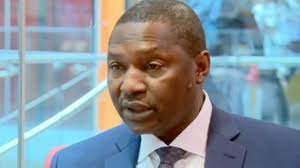Malami denies $2.4b oil sale, says no evidence to back it up
By Jeph Ajobaju, Chief Copy Editor
Federal Attorney General and Justice Minister Abubakar Malami has dismissed as false allegation that 48 million barrels of oil worth $2.4 billion were illegally sold to China by rouge elements in the federal government who stole the money.
Malami made the point on Thursday when he appeared before House of Representatives Ad Hoc Committee investigating alleged loss of more than $2.4 billion from the alleged illegal oil sale to China in 2015 and other oil exports from 2014 to date.
He was accompanied by the Permanent Secretary, Ministry of Justice/Solicitor-General of the Federation, Beatrice Jedy-Agba.
“Mr Chairman,” Malami began in his presentation, “let me state on record and for the benefit of Nigerians and the committee, that the allegations relating to the 48 million barrels are baseless.
“The allegation is unfounded. It is lacking in merit, and indeed lacking in substance. It is in its own right – the allegation – devoid of any reasonable grounds pointing to a material suspicion that is cogent enough to invoke the constitutional oversight of the committee.
“Why do I say so? Sometime in 2016, allegations were rife and hyped in social media. There were allegations of the existence of stolen 48 million barrels of Nigerian crude oil in China, said to have been valued at $2.4 billion.
“President Muhammadu Buhari informally requested the Attorney General – making reference to my humble person, [the then Group Managing Director, Nigerian National Petroleum Corporation] Mele Kyari; former Director General, Department of State Services, Lawal Daura; and the late Abba Kyari [the then Chief of Staff to the President] to look into it and advise.
“But unfortunately, Mr Chairman, for there to be reasonable grounds for suspicion, at least you require certain basic facts. If you are talking of a product, you cannot establish the substance relating thereto without confirming the origin of the purported product in China.
“If you talk of a product in China, is it of Nigerian origin? That can be established by way of sample and specification. Is it Bonny Light, which you know apparently emanates from Nigeria? The basic detail of the existence of the product and connecting it to Nigeria was not there at all.”
Malami insisted there were no particulars of the vessels that transported the fuel to China.
“They were not available at our disposal at all,” he said, adding no Chinese authority confirmed receipt and custody of the product in China.
“The issue is simple. There were no reasonable grounds for suspicion of the fact that the purported oil product either exists in spirit or in fact. Or, indeed, it exists in China but is in no way connected to Nigeria.
“All efforts on our part to get details had proven abortive. So, it was a committee that was dead on arrival because it had not been formally constituted and our informal findings did not support, suggest or provide information that could support (the investigation). So, we could not establish the substance in the allegation.”
__________________________________________________________________
Related articles:
Failure to meet OPEC quota costs Nigeria $2.5b monthly
Nigerian elite steal $46.16b crude oil in 7 years
Oil states mount up N4tr debt despite extra federal allocation
__________________________________________________________________
Protecting whistle-blowers
On the issues the panel raised in the first letter concerning whistle-blowers and processed recoveries, Malami explained the whistle-blower policy of the government is coordinated by the Ministry of Finance, Budget and National Planning “and all payments” to whistle-blowers were made by the ministry, according to reporting by The PUNCH.
“It is to be noted that whistle-blowing thrives on confidentiality and protection of information. Therefore, disclosing the details of the whistle-blowers at a public hearing breaches the confidentiality provision of which the Office of the Attorney General of the Federation was committed to, arriving from the whistle-blowers, on account of their personal and national security.”
He said he would provide the lawmakers with only information that would not expose whistle-blowers.
Malami also asserted that only the Ministry of Finance, Budget and National Planning, Office of the Accountant General of the Federation, and the Central Bank of Nigeria (CBN) could provide details of accounts from which recovered funds are kept as well as withdrawals from the accounts.
He listed some of the recoveries to include those from former Military Head of State, the late Sani Abacha; former Delta Governor James Ibori; and former Bayelsa Governor, the late Diepreye Alamieyeseigha.
“For the information of the committee, the Office of the Attorney General does not maintain custody of an account. All accounts associated with recoveries, generally speaking, are being maintained by the Central Bank,” he Malami clarified, adding his office only approves opening of such accounts and does not run them.




